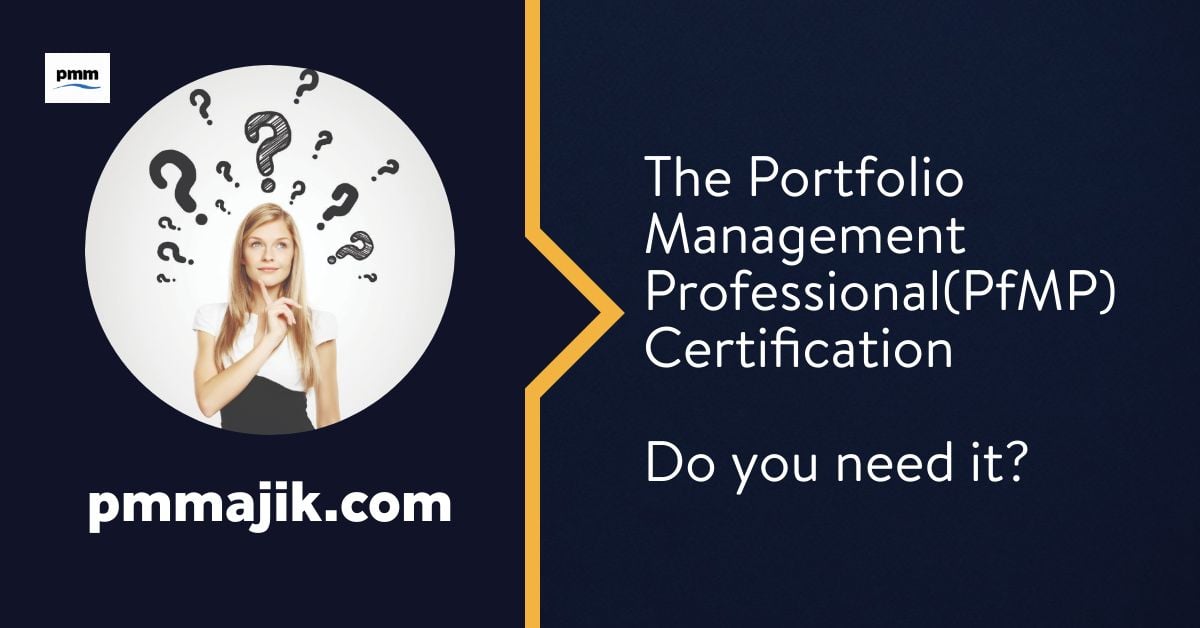Whether your company calls your office a project management office (PMO) or portfolio management, your tasks are likely the same. It’s worth exploring whether the Portfolio Management Professional (PfMP) certification is right for your needs.
As a step up from the Project Management Professional certification that we’ve looked at, obtaining this certificate can be a logical step in your PMO career. We’re going to look at everything you need to know about the PfMP, including:
- Where the certification comes from
- What you need before you start
- How much PfMP costs
- What you learn through the PfMP
- The good and the not so great about the certificate
Who certifies the PfMP?
The PfMP is provided by the Project Management Institute or PMI. It’s an organisation that’s been in operation since 1969, advocating for the professionalisation of the project management field.
The PMI is well-known for its certification courses, with the PMP being very widely recognised. The PfMP has been available since 2013, and there are currently certified portfolio managers across 68 countries.
What are the requirements for the PfMP certification?
To take the PfMP certification, there are a range of requirements in terms of professional experience and education.
To be accepted for assessment, you need to have a combined total or eight years of professional business experience in the last 15, plus:
- A high school diploma, associate-level degree, or similar
- Seven years experience in portfolio management
OR
- A four-year degree
- Four years working in portfolio management
There’s no requirement to have taken the PMP before you go for this level of certification.
To maintain your PfMP, you need to complete 60 Professional Development Units (PDUs) through the PMO every three years. This will allow you to recertify at a cost of US$150 for non-members of PMI and $60 for members.
How do I get PfMP certified?
There are two steps to getting the PfMP certificate. First, your skills and experience will be reviewed by an expert panel of volunteers to ensure you meet the criteria of the certificate.
Next, you need to take a 170-question multiple-choice test. This is based on the Standards for Portfolio Management book that is available on the PMI website for free and is 202 pages long.
Once you pass the exam, your certification is valid for three years.
How much does the PfMP cost?
If you are a member of the PMI, certification costs US$800, whilst non-members will pay US$1,000. You don’t have to purchase any books, but you may benefit from taking online classes or joining study groups.
If you don’t pass your multiple-choice exam the first time around, you’ll pay US$600 to retake it as a member, or US$800 as a non-member.
What do I learn during PfMP certification?
You may find that you learn new practices and procedure when you start to study for the test, or you could formalise a lot of things that you already know. It will depend on how you manage your portfolio or PMO already.
The questions cover five fields, namely:
- Strategic alignment of projects with business goals
- Governance
- Managing portfolio performance
- Risk management across the portfolio
- Managing communications between teams
With the best practices and frameworks you’re expected to know all covered in the Standards in Portfolio Management book that we mentioned a little earlier.
What are the pros and cons of the PfMP certification?
Pros of completing PfMP
- You should get a deeper knowledge of how to run your office, formalised within structures
- You’ll grow professionally, with new knowledge and gain respect from peers
- It will look impressive on your CV when you’re looking for a new PMO role – there’s a big time and financial commitment involved
- It’s the most elite project management certification available
Cons of completing PfMP
- It’s unlikely to directly affect your job prospects – it’s rare to find it as a requirement in a PMO job posting
- There’s currently no data available that says certificate holders will earn more money over their career
- Only around 850 around the world are PfMP certified, so there is less community than for PMP
The take-home
If you’re an executive or working at a senior level within a PMO structure, having this certificate can set you apart and looks impressive on your CV.
Do you need the Portfolio Management Professional certification? That will depend on your career ambitions and whether you want to invest the time and money into it – it’s unlikely your employer will demand it, but they will likely appreciate it.






